 KidsOK, a tracking service that lets parents locate their child using a mobile phone, has gone on sale in the UK today,
KidsOK, a tracking service that lets parents locate their child using a mobile phone, has gone on sale in the UK today,
Created by mTrack Services, the firm claim that they can establish the location of a mobile phone within 60 seconds.
Concerned/nosey parents can ‘ping’ their child’s mobile by sending a text message to 60777 including the child’s name (e.g. texting “ping johnny” will instruct KidsOK to identify the position of the child’s phone).
![]() Parents will then receive a text description and map of the location where there little Johnny’s phone currently resides, accurate to within 500m in built up areas using GSM location-based technology..
Parents will then receive a text description and map of the location where there little Johnny’s phone currently resides, accurate to within 500m in built up areas using GSM location-based technology..
Richard Jelbert, CEO and co-founder of mTrack Services, says the service will offer parents an alternative to sending “embarrassing” calls or text messages to their children while they’re out playing with their mates.
The service has been endorsed by children’s charity Kidscape and all mobile numbers are encrypted by the KidsOK servers to ensure privacy.
Parents also have to go through Home Office approved security checks during registration before they are able to use the service.
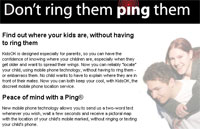 The bit that may strike fear into parents trying to foist these phones on their offspring is that fact that kids have to opt in to the KidsOK service and they can turn off the service any time they like.
The bit that may strike fear into parents trying to foist these phones on their offspring is that fact that kids have to opt in to the KidsOK service and they can turn off the service any time they like.
Like when they want to have fun.
The KidsOK pack, retailing for £39.95 (~US$70, ~€58), will include the first year’s subscription, three handsets enabled and the first ten pings.
Parents can purchase the packs throughout the UK from outlets such as Arcadia Outfit, Comet Destination, BHS, Boots, Millets, Blacks and The Link.
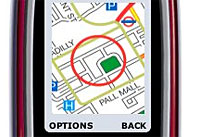 Larger families can enable further handsets on payment of £4.95 p.a. per handset (~US$8.75, ~€7.25). Further ‘pings’ are purchased in bundles of 20 from KidsOK for £9.95 (~US$17.5, ~€14.5).
Larger families can enable further handsets on payment of £4.95 p.a. per handset (~US$8.75, ~€7.25). Further ‘pings’ are purchased in bundles of 20 from KidsOK for £9.95 (~US$17.5, ~€14.5).
So far, O2, Orange, T-Mobile and Vodafone have enabled the service but presently children’s phones on Virgin and 3 cannot be located.
The service doesn’t require a PC or extra software, but parents using the service need their mobile phones to be enabled for WAP (GPRS).
mTrack Services have stated that each pack sold generates £1 towards the KidsOK Charitable Trust, providing donations to a variety of children’s charities and good causes.
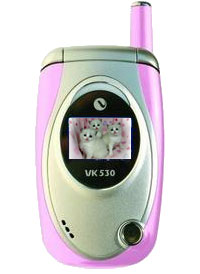 With a survey that could be described as pointless fluff at best and patronising drivel at worst, Vodafone D2 have trotted out the details of their ‘Women and Mobile Phones’ market research survey.
With a survey that could be described as pointless fluff at best and patronising drivel at worst, Vodafone D2 have trotted out the details of their ‘Women and Mobile Phones’ market research survey. Neatly half of women use the camera on their phone with 37 percent of respondents citing the provision of Bluetooth for wireless data transfer as important.
Neatly half of women use the camera on their phone with 37 percent of respondents citing the provision of Bluetooth for wireless data transfer as important. We had a report from a reader today that he’d been … ehm, carrying out tests on his content filtering service. This entailed going to sites with photos of naked bodies – purely to test that the content filter blocked his access to them you understand. One of first sites he went to was the well known UK tabloid, The Sun.
We had a report from a reader today that he’d been … ehm, carrying out tests on his content filtering service. This entailed going to sites with photos of naked bodies – purely to test that the content filter blocked his access to them you understand. One of first sites he went to was the well known UK tabloid, The Sun. The piece in the Gizmo section of the site and paper features BT’s new model to promote BT Communicator, Michelle Marsh.
The piece in the Gizmo section of the site and paper features BT’s new model to promote BT Communicator, Michelle Marsh.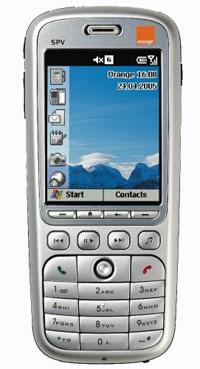 It’s been a long time coming, but Orange have finally announced that their Windows Mobile-powered SPV C550 smartphone will go on sale later this month
It’s been a long time coming, but Orange have finally announced that their Windows Mobile-powered SPV C550 smartphone will go on sale later this month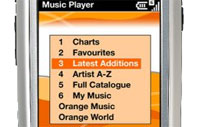 Songs downloaded through the phone’s Music Player software are DRM-protected, although the built in Fireplayer application will let punters remix their fave tunes into ringtones.
Songs downloaded through the phone’s Music Player software are DRM-protected, although the built in Fireplayer application will let punters remix their fave tunes into ringtones.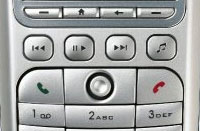 Matthew Kirk, Director of Devices at Orange was ready and willing to spin out the PR schmooze: “Since the launch of the first SPV handset three years ago, Orange has led the development of smartphones and provided its customers with a choice of the latest and most powerful devices. The Orange SPV C500 was the world’s smallest smartphone and today its successor provides the first realistic alternative to carrying around a separate MP3 player, phone and PDA.”
Matthew Kirk, Director of Devices at Orange was ready and willing to spin out the PR schmooze: “Since the launch of the first SPV handset three years ago, Orange has led the development of smartphones and provided its customers with a choice of the latest and most powerful devices. The Orange SPV C500 was the world’s smallest smartphone and today its successor provides the first realistic alternative to carrying around a separate MP3 player, phone and PDA.” Two users of the same online bulletin board were in the same carriage of a London Tube train that was involved with the blast last week.
Two users of the same online bulletin board were in the same carriage of a London Tube train that was involved with the blast last week. Without the discussion boards on urban75 or the Internet, the likelihood of two people caught up in the explosions meeting again, is highly unlikely.
Without the discussion boards on urban75 or the Internet, the likelihood of two people caught up in the explosions meeting again, is highly unlikely. ‘The Man’ in the form of the EC wants to introduce regulation to the Internet by bringing in controversial rules to cover television online, according to a report in the Times.
‘The Man’ in the form of the EC wants to introduce regulation to the Internet by bringing in controversial rules to cover television online, according to a report in the Times.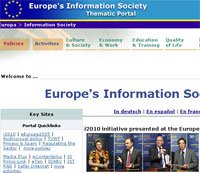 Internet-delivered TV is currently unregulated in the UK, so there is no compulsion for Web broadcasters to respect rules governing accuracy and impartiality or taste and decency that apply to all other analogue and digital channels.
Internet-delivered TV is currently unregulated in the UK, so there is no compulsion for Web broadcasters to respect rules governing accuracy and impartiality or taste and decency that apply to all other analogue and digital channels.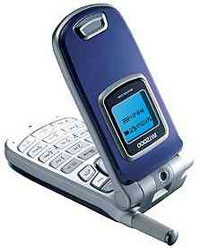 The growth of photo and video-capable phones has resulted in news agencies sourcing more and more content from members of the public who have used their mobiles to record disaster scenes.
The growth of photo and video-capable phones has resulted in news agencies sourcing more and more content from members of the public who have used their mobiles to record disaster scenes. Jonathan Klein, CNN’s U.S. chief believes this “citizen journalism” will become a more important part of coverage in major news events. “No question about it,” he said. “There’s been a lot of talk in terms of the increased democratization of the news media relating to blogs and the like. This is another example of the citizen journalist.”
Jonathan Klein, CNN’s U.S. chief believes this “citizen journalism” will become a more important part of coverage in major news events. “No question about it,” he said. “There’s been a lot of talk in terms of the increased democratization of the news media relating to blogs and the like. This is another example of the citizen journalist.” The UK record industry trade association the BPI has revealed that download sales in 2005 have raced past the ten-million mark – almost twice the amount for the whole of 2004.
The UK record industry trade association the BPI has revealed that download sales in 2005 have raced past the ten-million mark – almost twice the amount for the whole of 2004. Illegal music downloads remain a thorn in the side of the industry, but the growth in legal downloads now outstrips the growth in dodgy file sharing with Jamieson adding, “The battle against illegal files-haring will continue, but we are delighted to have hit this milestone so soon”.
Illegal music downloads remain a thorn in the side of the industry, but the growth in legal downloads now outstrips the growth in dodgy file sharing with Jamieson adding, “The battle against illegal files-haring will continue, but we are delighted to have hit this milestone so soon”.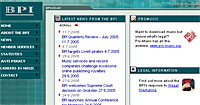 The resurgence of vinyl has been attributed to British indie and rock acts love affair with their near ancient format, with bands like Iron Maiden’s, Libertines, Babyshambles, Kaiser Chiefs and Franz Ferdinand all releasing songs on vinyl.
The resurgence of vinyl has been attributed to British indie and rock acts love affair with their near ancient format, with bands like Iron Maiden’s, Libertines, Babyshambles, Kaiser Chiefs and Franz Ferdinand all releasing songs on vinyl.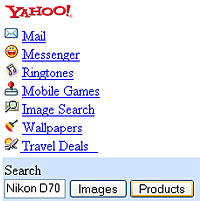 Yahoo! UK and Ireland have launched a handy new mobile search service which allows consumers to check the prices of goods via Yahoo! WAP services when they’re out and about.
Yahoo! UK and Ireland have launched a handy new mobile search service which allows consumers to check the prices of goods via Yahoo! WAP services when they’re out and about.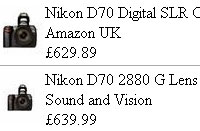 A result screen then displays images, pricing and product information, providing users with the low down about the cheapest prices around.
A result screen then displays images, pricing and product information, providing users with the low down about the cheapest prices around. However, if you persevere and click through to the next results page, a ‘compare’ link should magically appear under some products and this will let you access its full details.
However, if you persevere and click through to the next results page, a ‘compare’ link should magically appear under some products and this will let you access its full details. Mobile phone networks in London were overwhelmed for several hours following a series of terrorist blasts across central London.
Mobile phone networks in London were overwhelmed for several hours following a series of terrorist blasts across central London.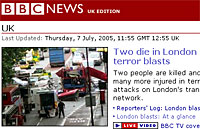 As with 9/11, many people turned to the Web for news and updates, resulting in major news sites struggling with the enormous surge in traffic.
As with 9/11, many people turned to the Web for news and updates, resulting in major news sites struggling with the enormous surge in traffic.